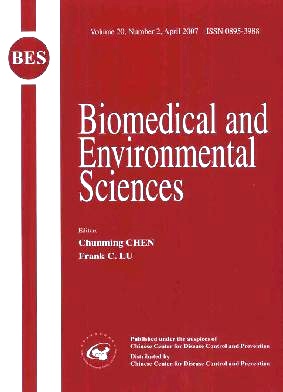Effects of Copper-phenanthroline on Pentschlorophenol-induced Adaptation and Cell Death of Escherichia coli
-
Key words:
- Adaptation /
- Cell death /
- Cytotoxicity /
- Escherichia coli /
- Oxidative phosphorylation /
- Pentachlorophenol /
- 1,10-phenanthroline-copper
Abstract: Objective To evaluate the effects of copper-phenanthroline (CuOP) on pentachlorophenol (PCP)-induced adaptation and cell death of Escherichia coli. Methods Bacterial growth and adaptation to PCP were monitored spectrophotometrically at 600 nm. Inactivation of bacterial cells was determined from colony count on agar dishes. Cellular ATP content and accumulation of PCP were assessed by chemiluminescence and HPLC analysis respectively. The formation of PCP-Cu-OP complex was shown by UV-visible spectra. Results Escherichia coli (E. coli) could adapt to PCP, a wood preservative and insecticide used in agriculture. The adaptation of E. coli to PCP prevented its death to the synergistic cytotoxicity of CuOP plus PCP and declined cellular accumulation and uncoupling of oxidative phosphorylafion of PCP. Furthermore, CuOP and PCP neither produced reactive oxygen species (ROS) nor had a synergistic effect on uncoupling of oxidative phosphorylation in E.coli. The synergistic cytotoxicity of CuOP and PCP in E. coli might be due to the formation of lipophillc PCP-Cu-OP complex.Conclsion Our data suggested that adaptation of E. coli to PCP decreased the synergistic effects of CuOP and PCP on prokaryotic cell death due to the formation of lipophilic PCP-Cu-OP complex, but it had no effect on the uncoupling of oxidative phosphorylation and production of reactive oxygen species in E. coli.
| Citation: | XUE-WEN ZHANG, RONG-GUI LI, XIN WANG, SHUAN-HU ZHOU. Effects of Copper-phenanthroline on Pentschlorophenol-induced Adaptation and Cell Death of Escherichia coli[J]. Biomedical and Environmental Sciences, 2007, 20(2): 106-112. |







 Quick Links
Quick Links
 DownLoad:
DownLoad: